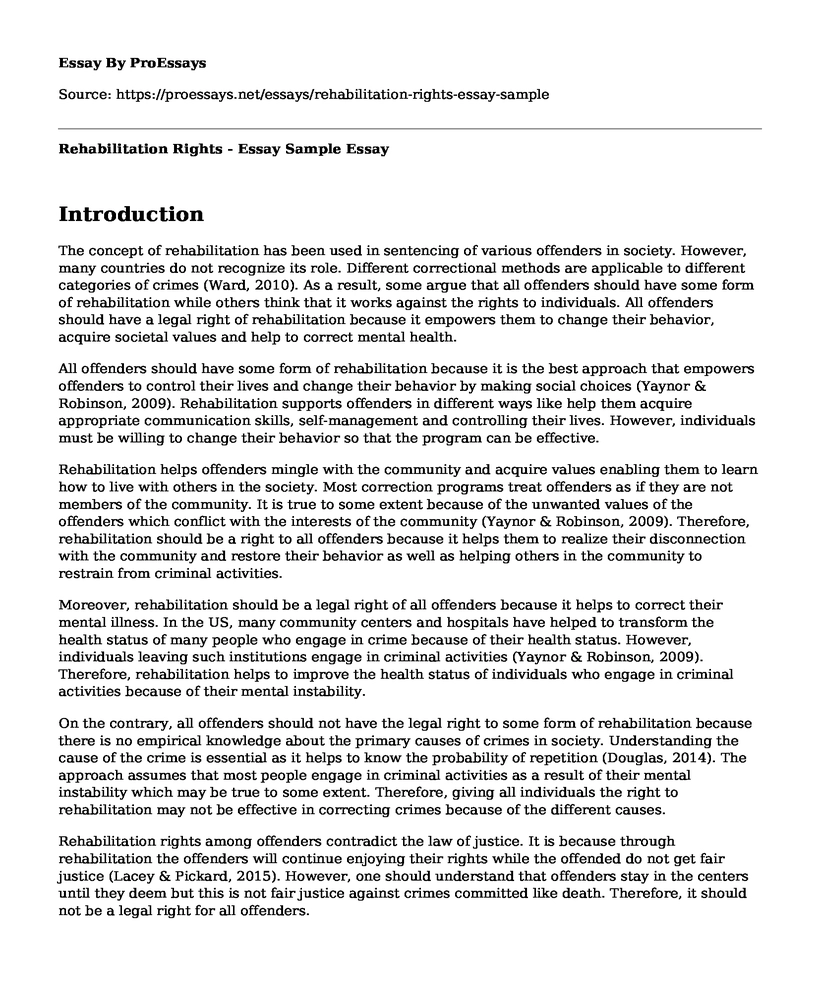Introduction
The concept of rehabilitation has been used in sentencing of various offenders in society. However, many countries do not recognize its role. Different correctional methods are applicable to different categories of crimes (Ward, 2010). As a result, some argue that all offenders should have some form of rehabilitation while others think that it works against the rights to individuals. All offenders should have a legal right of rehabilitation because it empowers them to change their behavior, acquire societal values and help to correct mental health.
All offenders should have some form of rehabilitation because it is the best approach that empowers offenders to control their lives and change their behavior by making social choices (Yaynor & Robinson, 2009). Rehabilitation supports offenders in different ways like help them acquire appropriate communication skills, self-management and controlling their lives. However, individuals must be willing to change their behavior so that the program can be effective.
Rehabilitation helps offenders mingle with the community and acquire values enabling them to learn how to live with others in the society. Most correction programs treat offenders as if they are not members of the community. It is true to some extent because of the unwanted values of the offenders which conflict with the interests of the community (Yaynor & Robinson, 2009). Therefore, rehabilitation should be a right to all offenders because it helps them to realize their disconnection with the community and restore their behavior as well as helping others in the community to restrain from criminal activities.
Moreover, rehabilitation should be a legal right of all offenders because it helps to correct their mental illness. In the US, many community centers and hospitals have helped to transform the health status of many people who engage in crime because of their health status. However, individuals leaving such institutions engage in criminal activities (Yaynor & Robinson, 2009). Therefore, rehabilitation helps to improve the health status of individuals who engage in criminal activities because of their mental instability.
On the contrary, all offenders should not have the legal right to some form of rehabilitation because there is no empirical knowledge about the primary causes of crimes in society. Understanding the cause of the crime is essential as it helps to know the probability of repetition (Douglas, 2014). The approach assumes that most people engage in criminal activities as a result of their mental instability which may be true to some extent. Therefore, giving all individuals the right to rehabilitation may not be effective in correcting crimes because of the different causes.
Rehabilitation rights among offenders contradict the law of justice. It is because through rehabilitation the offenders will continue enjoying their rights while the offended do not get fair justice (Lacey & Pickard, 2015). However, one should understand that offenders stay in the centers until they deem but this is not fair justice against crimes committed like death. Therefore, it should not be a legal right for all offenders.
Conclusion
Rehabilitation has gained popularity in recent years even though not many countries have legally recognized it. Rehabilitation helps to empower criminals to control their lives, acquire societal values and corrects mental illness. However, it should not be a legal right to all offenders because it contradicts the law of fair and consistent justice and no empirical knowledge on the causes of all crimes. Nevertheless, it should be a legal right to all offenders.
References
Douglas, T. (2014). Criminal Rehabilitation Through Medical Intervention: Moral Liability andthe Right to Bodily Integrity. The Journal of Ethics 18(2): 101-122.
Lacey, N & Pickard, H. (2015). To Blame or to Forgive? Reconciling Punishment andForgiveness in Criminal Justice. Oxford Journal of Legal Studies 35(4): 665-696.
Ward, T. (2010). Is offender rehabilitation a form of punishment? British Journal of ForensicPractice 12(4): 3-11.
Yaynor, P & Robinson, G. (2009). Why help offenders? Arguments for rehabilitation as a penalstrategy. European Journal of Probation 1(1): 3-20.
Cite this page
Rehabilitation Rights - Essay Sample. (2022, Dec 14). Retrieved from https://proessays.net/essays/rehabilitation-rights-essay-sample
If you are the original author of this essay and no longer wish to have it published on the ProEssays website, please click below to request its removal:
- Impact of Death Penalty
- An Analysis of Walt Disney's Social Performance: Environment and Human Rights
- Gay Right Movements in the US Essay Example
- Essay on the Unrewarded Labor of African Americans: A Trace of Economic History
- Essay Sample on The Role of Courts in Our World
- 8th Amendment: Best Approach for Upholding Human Dignity and Rights - Essay Sample
- Treatment versus Punishment - Free Essay Example







